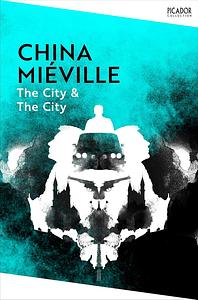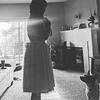Take a photo of a barcode or cover
The more Mieville I read, the more I wonder if I'll enjoy anything as much as the first couple books I read by him.
The City & the City is solid, but it's not as good as BasLag or Embassytown. It has a bizarre premise, which is pretty interesting in that it takes one of the most absurd notions imaginable and takes it deadly serious. It even pushes the absurdity further and further, begging you to laugh at what's happening, but the earnestness of the narrator keeps you willing to accept this ridiculousness.
What's maybe strangest about this novel is that it's really not very funny. Like, it seems like at least some of this should be played for laughs. Really, it seems like the whole novel was meant to be a comedy just from reading the premise. But it takes itself so seriously that there's no real time for laughter, which weirdly works for it, I think.
Of course, the novel is a big one note, and so while I like how Mieville pushes the concept past the breaking point and makes you go along and follow his lead through shear willpower, it really could use some rounding out, I think.
Mieville's determined to write a novel in every genre, and I mostly think it's a terrible decision. I like the ambition of such a project, but I think a lot of his work is much weaker.
Anyrate, this is solid and I enjoyed it. I'll probably keep reading Mieville, and digging back into his catalogue. Railsea next.
The City & the City is solid, but it's not as good as BasLag or Embassytown. It has a bizarre premise, which is pretty interesting in that it takes one of the most absurd notions imaginable and takes it deadly serious. It even pushes the absurdity further and further, begging you to laugh at what's happening, but the earnestness of the narrator keeps you willing to accept this ridiculousness.
What's maybe strangest about this novel is that it's really not very funny. Like, it seems like at least some of this should be played for laughs. Really, it seems like the whole novel was meant to be a comedy just from reading the premise. But it takes itself so seriously that there's no real time for laughter, which weirdly works for it, I think.
Of course, the novel is a big one note, and so while I like how Mieville pushes the concept past the breaking point and makes you go along and follow his lead through shear willpower, it really could use some rounding out, I think.
Mieville's determined to write a novel in every genre, and I mostly think it's a terrible decision. I like the ambition of such a project, but I think a lot of his work is much weaker.
Anyrate, this is solid and I enjoyed it. I'll probably keep reading Mieville, and digging back into his catalogue. Railsea next.
Amazing premise and really interesting exploration of the world and build-up of the mystery. Unfortunately the disappointing conclusion turned what would have been a 4/5 star into a 3. Felt like a lot of wasted potential to deepen the conspiracy, and I thought the solution to the mystery made the whole story a lot less interesting.
Beszel and Ul Qoma are two parts of a whole, a divided city. Not by a wall in the middle, rather all over the place, intertwined like a checkerboard. Your house in Beszel might be surrounded by buildings of Ul Qoma, or you go to a park and while the swing is in one city, the slide is in the other. The border, which you unconciously cross dozens of times a day, is enforced by the selective perception of its citizens. You are taught to simple unsee everything around you that is not in 'your city'. If you fail to do so, punishment awaits.
Our protagonist is an inspector with the Beszel police force who investigates the murder of a young woman. It's a convoluted case that soon requires him to cross borders between the twin cities, and to fully uncover the truth he needs to go even deeper and find out what lies between the City and the City.
China Miéville's novels never disappoint when it comes to introducing unique and refreshing settings. In this urban fantasy / crime blend, he created a fascinating city (cities) located somewhere in the eastern outskirts of Europe, authentically mixed in with real world history and diplomacy. The world building is the star in this book, for a ~300 page standalone it's extremely detailed. Beszel and Ul Qoma have rich history, notable cultural differences and quirks. The unique political and psychological premise of the two cities make for a fantastic playground to maneuver the story in.
As far as plot and characters go, it's good but not outstanding. Inspector Borlú as the sole POV is solid but the cast around him is not very remarkable. The crime story that unfolds is thrilling to pursue, has a lot of momentum and offers an intriguing mystery that you'll want to uncover. The narrative is well paced and will keep you entertained for its duration, but it only really shines because of how well it works around the premise of the cities. Without the unique world building, it would be a rather mundane crime plot that doesn't stick out. But this is China Miéville's strength - his books always stick out.
dark
mysterious
medium-paced
Plot or Character Driven:
Plot
Strong character development:
Complicated
Loveable characters:
Yes
Diverse cast of characters:
Complicated
Flaws of characters a main focus:
Complicated
adventurous
challenging
dark
mysterious
tense
fast-paced
What a wild ride. Having finished this a few days ago my mind is still contemplating the universe created.
To begin with I would like to clarify that this was a mandated university read… so I was inherently distrustful for at least the first third of it.
Past that first third, confusion was very strong, I was unsure of what was happening, and frankly a little bit bored.
HOWEVER, things very much started to happen just over halfway through and from there I was hooked. What was originally a fairly boring concept that was confusing and felt like baseless grounds for a murder novel was now something that held more potential and intrigue. The final sections were completely and utterly wild. I didn’t foresee a lot of the actions that happened, and connections that were made from the beginning of the book well and truly came full circle and got explained (which I am discovering a lot of detective novels leave a loose end of the first few clues).
I enjoyed the final sections and because of that, it has been saved from a ⅕. In fact, knowing what I know, I would probably read it again so I could properly appreciate the first half to 2 thirds.
Conclusion? Difficult beginning, worth it in the end.
To begin with I would like to clarify that this was a mandated university read… so I was inherently distrustful for at least the first third of it.
Past that first third, confusion was very strong, I was unsure of what was happening, and frankly a little bit bored.
HOWEVER, things very much started to happen just over halfway through and from there I was hooked. What was originally a fairly boring concept that was confusing and felt like baseless grounds for a murder novel was now something that held more potential and intrigue. The final sections were completely and utterly wild. I didn’t foresee a lot of the actions that happened, and connections that were made from the beginning of the book well and truly came full circle and got explained (which I am discovering a lot of detective novels leave a loose end of the first few clues).
I enjoyed the final sections and because of that, it has been saved from a ⅕. In fact, knowing what I know, I would probably read it again so I could properly appreciate the first half to 2 thirds.
Conclusion? Difficult beginning, worth it in the end.
In short, it took longer than I would’ve liked to get into this one, but I am ultimately glad I read it.
The first third or so felt like a slog because of the confusing prose and world building. It’s a book club pick so I persisted. Once I found out archaeology was involved in the story, as an archaeologist myself I definitely felt more invested. Things picked up, and the final third was really well done and interesting. Perhaps it just took the author a while to find the right stride on this one.
Overall it was also a slower read that required more thought, so I’m glad that I took it on while on a break from grad school!
The first third or so felt like a slog because of the confusing prose and world building. It’s a book club pick so I persisted. Once I found out archaeology was involved in the story, as an archaeologist myself I definitely felt more invested. Things picked up, and the final third was really well done and interesting. Perhaps it just took the author a while to find the right stride on this one.
Overall it was also a slower read that required more thought, so I’m glad that I took it on while on a break from grad school!
challenging
mysterious
slow-paced
Plot or Character Driven:
Plot
Strong character development:
No
Loveable characters:
Yes
Diverse cast of characters:
No
Flaws of characters a main focus:
No
The City & The City, China Miéville. Read for the r/fantasy bingo challenge. Square: Impossible Places, for books set a book in locations that would break a physicist. The geometry? Non-Euclidean. The volume? Bigger on the inside. The directions? Merely a suggestion. Hard mode: at least 50% of the book takes place within the impossible setting. The trouble is, after finishing it, I don't think it fits. Having this book in a spec-fiction section, readers might presume the two cities are on overlapping planes of existence, or something like that, but the two actually only overlap in legal jurisdiction; nothing prevents any person from walking from Bezhel to Ul Qoma except the law, and the fear of breaking the law. No physicists were harmed in the making of these cities, though a sociologist might have been. It's really a commentary on authoritarian government control and the weight of social convention.
adventurous
challenging
mysterious
tense
slow-paced
Plot or Character Driven:
A mix
Strong character development:
Complicated
Loveable characters:
Yes
Diverse cast of characters:
Yes
Flaws of characters a main focus:
Complicated
My head is spinning from this one. The complexities of the two cities in this book and how they work together is intense and intricate.
The plot is so unique. It’s almost like taking a dystopian book and mixing in a police procedural thriller.
This is a book that requires focus and time to fully comprehend how two cities have nebulous borders that require citizens to unsee or unsense things that happen in the other city.
This is great for the thriller fan who wants something unlike any thriller they’ve read and isn’t looking for a quick, easy read.
The plot is so unique. It’s almost like taking a dystopian book and mixing in a police procedural thriller.
This is a book that requires focus and time to fully comprehend how two cities have nebulous borders that require citizens to unsee or unsense things that happen in the other city.
This is great for the thriller fan who wants something unlike any thriller they’ve read and isn’t looking for a quick, easy read.
adventurous
challenging
dark
emotional
mysterious
tense
medium-paced
Plot or Character Driven:
Plot
Strong character development:
Complicated
Loveable characters:
Complicated
Diverse cast of characters:
Yes
Flaws of characters a main focus:
No









